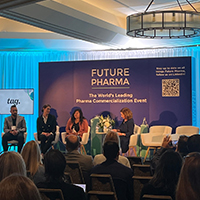
City Cancer Challenge: A gender-focused revolution in global oncology
At the 2024 Clinton Global Initiative Annual Meeting in New York late last year, a bold new chapter in global cancer care was unveiled. The City Cancer Challenge Foundation (C/Can), a Geneva-based non-profit, announced a transformative seven-year, $10 million initiative aimed at closing the gender gap in cancer care across 15 low- and middle-income countries (LMICs).
Titled Cities Taking Action for Gender Equity in Cancer Care, the initiative is a direct response to the findings of the Women, Power, and Cancer: a Lancet Commission report, and seeks to embed gender-responsive strategies into health systems at the city level.

A new lens on an old crisis
“Where you live defines the type of cancer care you’re going to get,” said Isabel Mestres, CEO of C/Can. “But what the Lancet Commission showed us is that who you are – specifically, being a woman – also determines the care you receive and the outcomes you experience.”
The statistics are stark. Of the 2.3 million women who die prematurely from cancer each year, 1.5 million deaths could be prevented through early detection and prevention, and 800,000 lives could be saved with equitable access to care. These figures underscore the urgency of addressing gender disparities in oncology, particularly in LMICs, where 70% of global cancer deaths occur.

The city model: Local solutions, global impact
By 2050, two-thirds of the world’s population is expected to live in urban areas, with low- and middle-income countries driving this growth. So it is that, if the growing cancer burden is to be effectively addressed, cities must play a fundamental role. And C/Can’s approach is rooted in its proven city engagement model, which treats cities as microcosms of national health systems.
“Cities are where we can see the whole system – primary, secondary, tertiary care, public and private sectors, academia, and policy – all interacting,” Mestres explained. “It’s manageable, yet comprehensive.”
This model has already shown success in strengthening cancer care systems. Now, C/Can is layering in a gender lens to ensure that interventions are not only systemic, but also inclusive. The initiative is commencing in three pilot cities – León (Mexico), Nairobi (Kenya), and Tbilisi (Georgia) – where gender-based disparities in cancer care have been identified.

From data to action: A gender-responsive framework
The initiative will unfold in three phases:
1. Understanding the gaps: Locally led research will identify gender-specific barriers in each city, incorporating the voices of patients, healthcare providers, and caregivers.
2. Designing tailored interventions: Each city will implement projects across four pillars – patient centricity, workforce development, access and quality, and knowledge generation – with a gender lens embedded in every component.
3. Implementation science: Local stakeholders will be trained in implementation research to evaluate the effectiveness of interventions and generate scalable evidence.
One poignant example shared by Mestres highlights the need for gender-sensitive care: in a male-dominated multidisciplinary team, a 60-year-old woman’s breast cancer treatment was decided without considering her personal preferences.
“They assumed she wouldn’t care about losing her breast because of her age,” Mestres said. “That’s not patient-centred care.”

Empowering women in oncology
The initiative also addresses gender imbalances in the oncology workforce. While women make up 70% of the cancer care workforce (and up to 90% including caregivers), only 25% hold leadership roles – dropping to 5% in low-income countries. To counter this, C/Can has launched a leadership programme in partnership with ASCO, targeting mid-career women oncologists.
“Fifty percent of our first cohort moved into leadership roles,” Mestres noted. “It’s not just about skills, it’s about belief. Believing they can lead.”
Plans are underway to expand this programme to include nurses, policymakers, and civil society leaders.

Partnerships that power change
The initiative is backed by a coalition of partners, including Amgen, MSD, Roche, Siemens Healthineers, and Global Focus on Cancer (supported by Eli Lilly). These companies provide not only funding, but also in-kind support, mentorship, and training.
“Pharma and biotech companies have a critical role,” said Mestres. “They bring expertise in gender policy, showcase women in leadership, and can help close the gap in clinical trial representation, where women – especially in LMICs – are still underrepresented.”
One standout example: Siemens Healthineers funded travel for seven women leaders from LMICs to attend the UN General Assembly, giving them a platform to share their experiences and advocate for change.
“It was just travel expenses,” Mestres said, “but it was transformative. They were everywhere in New York, connecting, advocating, and building a powerful community.”

Aligning with the SDGs
The initiative aligns with several UN Sustainable Development Goals, particularly:
• SDG 3: Good health and well-being
• SDG 11: Sustainable cities and communities
• SDG 17: Partnerships for the goals
Yet, Mestres warns that progress is lagging: “Only 2% of overseas development assistance goes to non-communicable diseases, and even less to cancer. We need more funding, more evidence, and more collaboration.”

A call to action
Mestres issues a clear call: “We have the model. We have the stakeholders. But we can’t do this alone. We need partners – especially those with experience in gender equity from fields like HIV and maternal health – to join us.”
For oncology professionals, the message is equally clear: gender equity is not a peripheral issue, it’s central to improving outcomes.
“This is about ensuring that every woman, regardless of where she lives or who she is, receives the care she deserves,” Mestres said. “And that’s something we can all get behind.”
About the author
Nicole Raleigh is pharmaphorum’s web editor. Transitioning to the healthcare sector in the last few years, she is an experienced media and communications professional who has worked in print and digital for over 20 years.
Supercharge your pharma insights: Sign up to pharmaphorum's newsletter for daily updates, weekly roundups, and in-depth analysis across all industry sectors.
Want to go deeper?
Continue your journey with these related reads from across pharmaphorum
Click on either of the images below for more articles from this edition of Deep Dive: Commercialisation 2024












